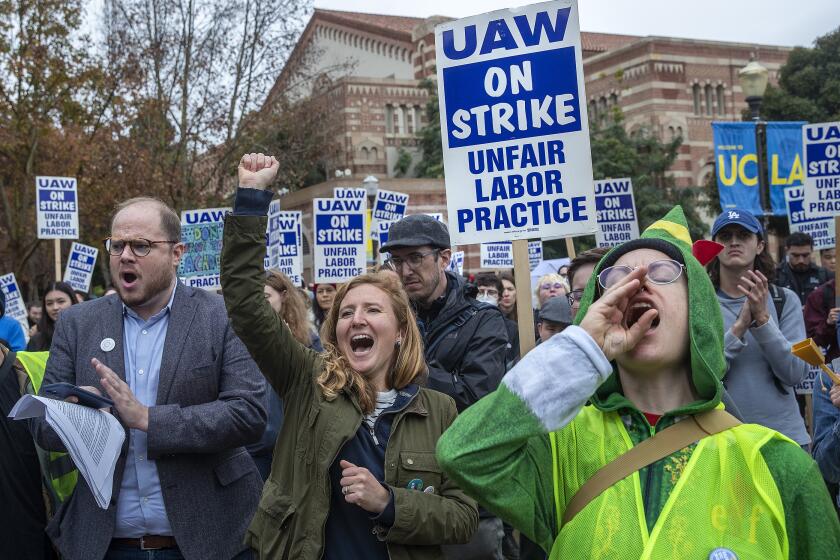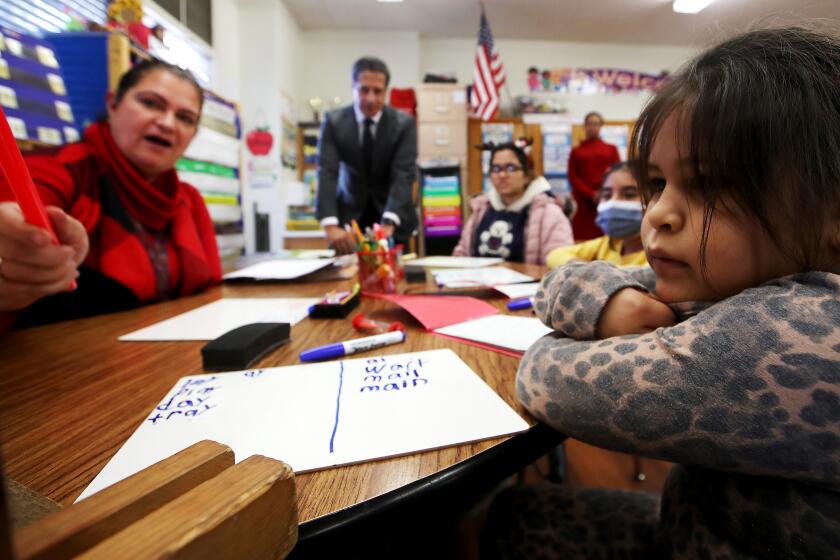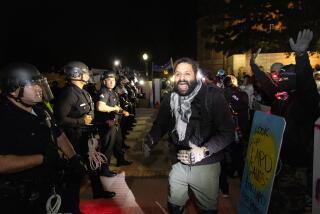Teachers at elite UCLA Lab School strike, saying model campus culture is changing
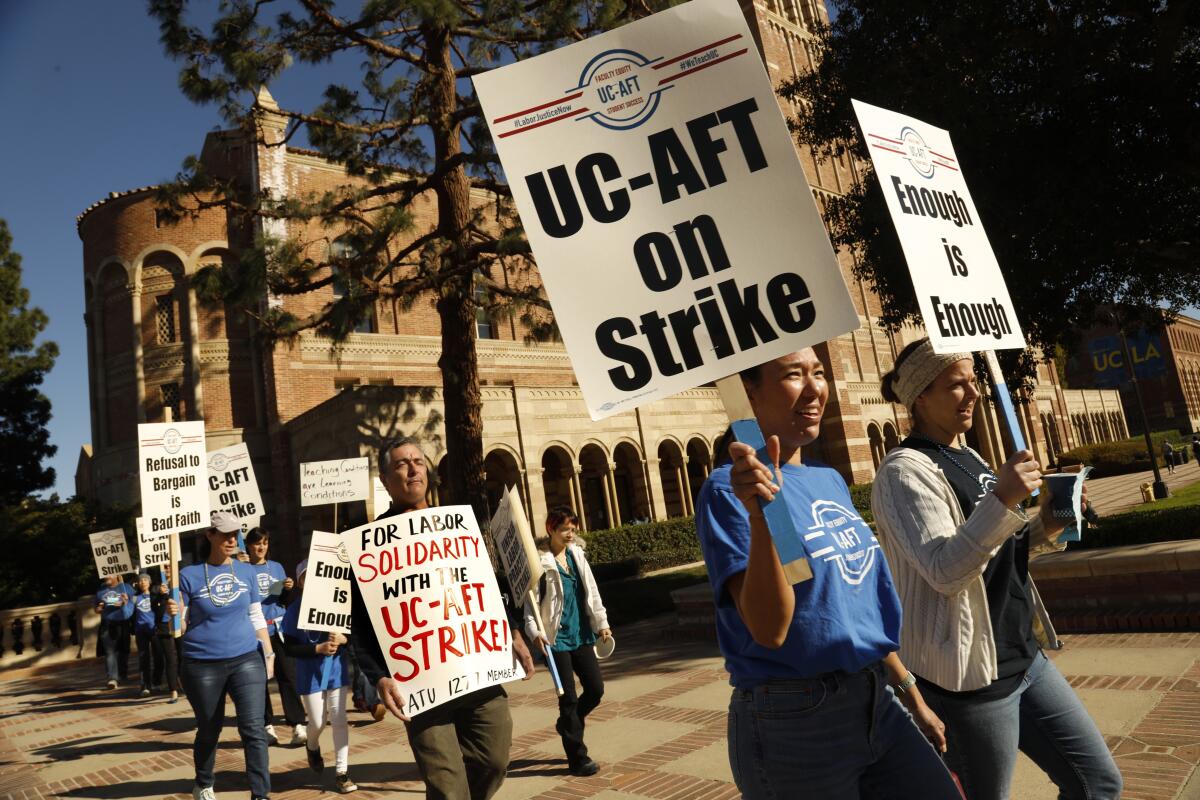
- Share via
For decades, UCLA Lab School, an elite pre-K-through-sixth-grade school nestled in a quiet corner of the UCLA campus, has offered a nurturing environment for students whose parents won a coveted spot for their child.
Run by the university’s School of Education and Information Studies as its hands-on education laboratory, multiple expert teachers curate lessons based on evolving practices. The student body is diverse, students are selected for admission, and tuition is up to $25,000 with about a third of students on financial aid, the school website says.
But the teachers — who welcome UCLA researchers into their classrooms, conduct studies themselves and report their findings to educators — have become dispirited over working conditions and went on strike Wednesday morning. Their public actions offer rare insight into long-simmering conflicts at a school dedicated to modeling the best practices in education.
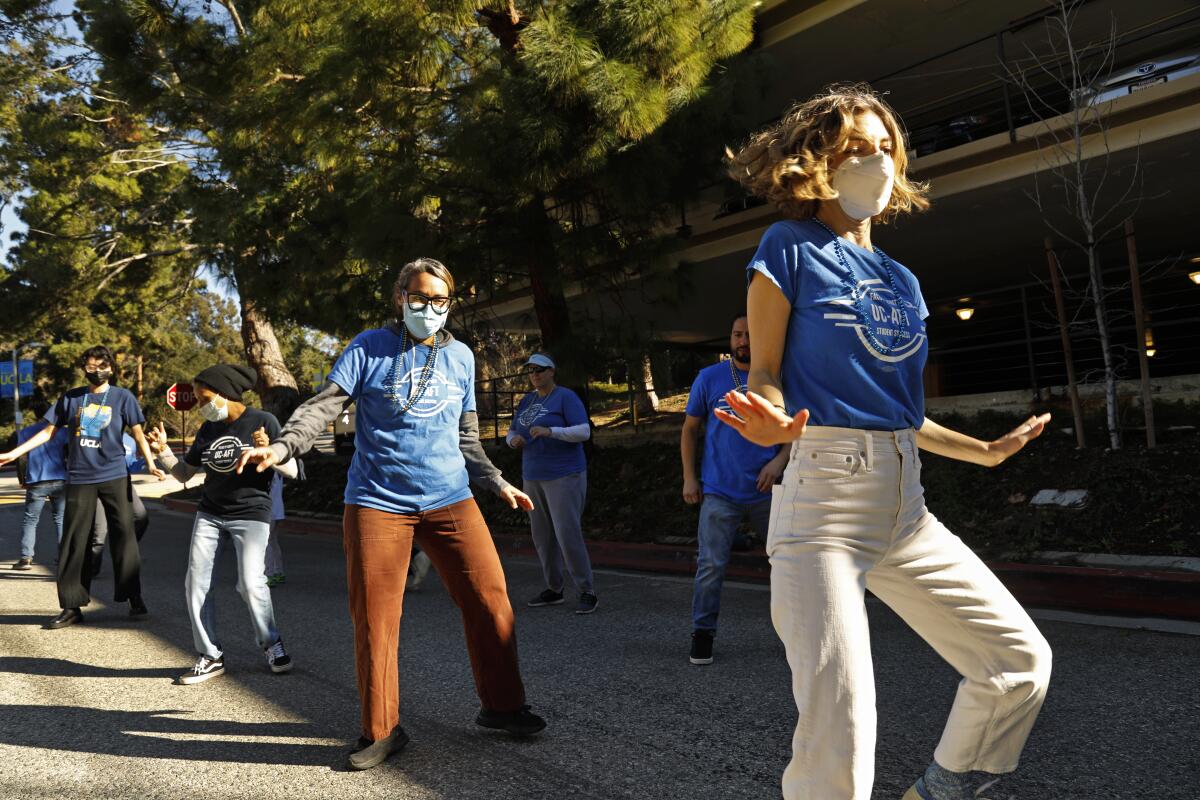
The teachers say management no longer values the school’s core mission of research and outreach because administrators have refused to negotiate terms that serve those interests. Their two-day strike is not about salaries or benefits. Instead, they walked out over alleged unfair labor practices.
“We have a leadership that does not seem to be concerned about the mission and vision of the school ... and very little understanding of the culture of the lab school, who we are and what we represent,” said Rebecca Heneise, a dual-language demonstration teacher at the lab school.
On Wednesday morning, about 25 demonstration teachers on strike stood in the pickup and dropoff area behind the school and rallied together. Then they marched to the office of the dean of the education school, Tina Christie. They chanted: “When our school’s integrity is under attack, what do we do? Rise up, fight back!” And in Spanish, “Escucha, Escucha, estamos en la lucha!” Listen up, listen up, we are in the fight.
The massive and successful strike by University of California academic workers has helped energize an unprecedented surge of labor organizing among their peers nationwide.
No one answered the door to Christie’s office. Instead, an employee of the university’s labor relations department greeted the group and collected its petition of nearly 2,000 signatures.
“I could have never dreamed that teachers would be on strike at the lab school,” said Judith Kantor, who has been a teacher at the school since the 1970s. “We’re working in an environment where people are afraid.”
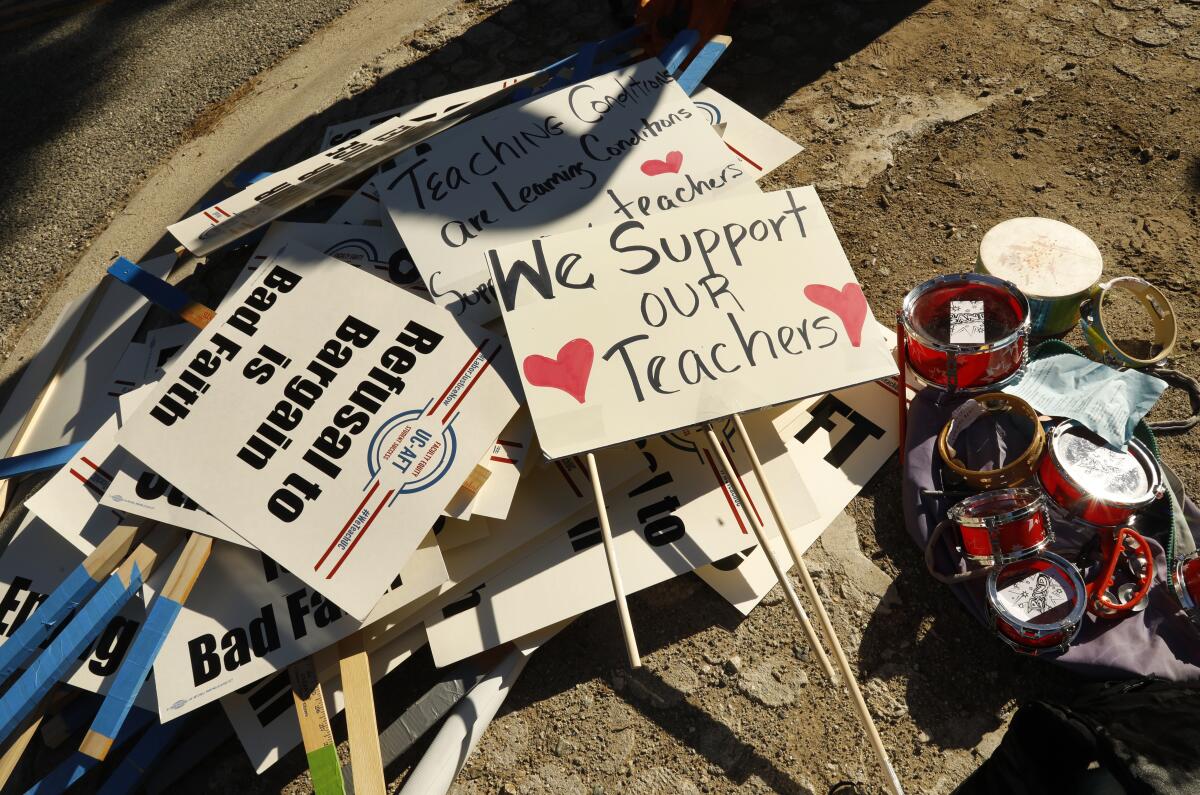
Research, once a key part of the school’s mission, has become less of a focus, teachers said. Planning days have been reduced. Some classrooms have become limited to one teacher. A $2,000 annual stipend for dual-language teachers, who create curriculum in two languages, was taken away without notice, teachers said.
The faculty, who are members of the University Council-American Federation of Teachers, say that UC management has violated their rights to bargain by delaying the process and denying them the right to negotiate a side letter that includes working conditions specific to the needs of a lab school.
Teachers also say that the administration has made changes to the school’s practices, including extending the number of school days without their input or negotiation. The university is open only to negotiating salary, which is part of their primary contract, ratified in 2021.
On behalf of the teachers, the union filed an unfair labor practices complaint with the state Public Employment Relations Board in June. A hearing on the complaint is scheduled in spring.
The university declined to comment on specifics of the negotiations.
“We value the work of our UCLA Lab School Demonstration Teachers represented by UC-AFT. UCLA is negotiating in good faith with the union, and we are hopeful that an agreement can be reached soon,” the university said in a statement.
Lab school faculty have been under the same contract as UC lecturers, but school administrators had negotiated a side letter with terms specific to the school after the main contract was ratified. Side letters for the years 2011, 2014 and 2016 were successfully negotiated without issue, said Bill Quirk, lead UC-AFT negotiator for the lab school faculty.
Heneise said that the teachers asked management to come to the table to negotiate their new side letter in January 2022 and that they did not agree to meet until the summer.
“That right there was them not bargaining in good faith,” she said. “They kept stalling and stalling and stalling. It was then that they told us they would only talk about compensation. We passed 20 proposals to them, and they said they would look only at the one on compensation.”
Attendance was about half as much as L.A. Unified initially announced, a deeper review of data shows. The two extra learning days during winter break cost $36 million.
However, even negotiations on compensation have been unsuccessful. The teachers asked for a 15% raise, which the university countered with 4%, which Heneise said doesn’t account for the rising cost of living over the last three years, during which they have not received a raise.
The teachers say their demands are about maintaining the essence of the UCLA Lab School education that distinguishes it from other private schools and public schools in L.A.
The campus is surrounded by redwoods, green space and gardens, and a stream flows through the school, allowing the children to study and appreciate nature. Its 430 students, ages 4 through 12, from diverse backgrounds learn not only the mandated state curriculum, but also about topics that interest them and about current events and social justice issues.
Other schools in the UC system, including the UCLA Geffen Academy and the Preuss School at UC San Diego, have negotiated side letters that include similar terms.
“We’re not even saying you have to agree to everything,” said Jane Parkes, a demonstration teacher and alumna of the school. “We’ve been scratching our heads at a lot of this. It’s been a very sad time for a lot of us.”
Parkes said she remembers attending the school as a girl with a deep sense of autonomy and curiosity. It’s a feeling that teachers have been able to re-create for decades.
“The last eight years I’ve been a demonstration teacher, I’ve really seen the amount of planning that goes into giving children that experience,” she said. “We believe teaching conditions are learning conditions.”
While teachers picketed, students in 19 classrooms were taught by six teacher apprentices, said Sylvia Gentile, a demonstration teacher on the bargaining team.
Gentile, who teaches sixth-graders, said the students have been curious about the strike.
“They’re all over it. They’re like, ‘What are you striking for? What’s the classroom going to be like?’ They asked the brilliant question, ‘If we support you, should we come to school tomorrow or should we stay home?’”
Ayla, a 9-year-old student of the school who was joining her mother, Kim Morchower, a demonstration teacher, on the strike, said she was there to support her teachers.
“They make learning fun and it’s always exciting, because before I came, I didn’t like all the subjects. Now I love them,” she said. “They’re striking today because they’re not listened to and they feel the need to be heard ... so the school can be a better place.”
Rosie Torres, a dual-language demonstration teacher who has been with the school for 12 years, said she fears the culture that makes the school so special is being taken away.
“The lab school has always been a place of creativity, joy and innovation,” she said. “It’s a place where collaboration was valued and encouraged, and where students are taught about advocacy. That’s really why I’m here.”
But without notice, Torres said, some of those planning and professional development days were taken away.
LaToya Baldwin Clark, an assistant professor at the UCLA School of Law whose 10-year-old son attends the lab school, said she is standing behind the demonstration teachers because she has seen the difference they have made for her son.
For the record:
4:51 p.m. Jan. 25, 2023An earlier version of this report identified LaToya Baldwin Clark as LaToya Baldwin, a lecturer.
“It’s that he feels happy to go to school, he feels comfortable to go to school, “ she said. “The smile on his face is a smile that says, ‘I trust my teacher.’”
“These are people tasked with educating my child every day, and if they feel their work conditions aren’t reasonable, I tend to believe them,” she said. “I tend to believe the things they’re asking for are the things they need.”
More to Read
Sign up for Essential California
The most important California stories and recommendations in your inbox every morning.
You may occasionally receive promotional content from the Los Angeles Times.
